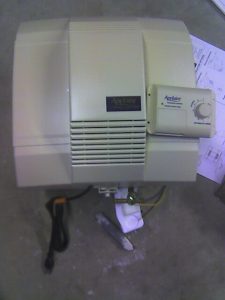A humidifier for the entire house and whole house humidifier cost aren’t just for show. It has a direct impact on a large part of your life.
Types and whole house humidifier cost
Any whole house humidifier will perform the same objective, but there are a few various ways the device can do it. The sort of humidifier you buy has an impact on the price. All of the humidifiers listed below are ducted humidifiers, which means they are connected to a home’s existing ductwork. However, the technology employed can differ.
Bypass Humidifiers
The return of your furnace or air handler is connected to a bypass humidifier. It does not actively force moisture into the system, unlike the other varieties. It is instead positioned to allow warm air from your heating system to pass through it. The humidifier’s moisture is absorbed by the air, which then travels throughout your home.
Bypass humidifiers rely on being able to be installed close to the return airflow of your system. Because they rely on the furnace or air handler for airflow, they lack several of the components found in other system types.
Power Humidifiers
The airflow from your HVAC system’s blower motor isn’t required by a power humidifier. It has its blower motor for circulating moisture through your ducting. Otherwise, the technology operates in the same way as a bypass humidifier, with air passing over water and absorbing moisture before being distributed throughout your home.
Steam Humidifiers
Whole-home steam humidifiers produce steam that passes through your home’s ductwork, as the name implies. These machines use electrical components to convert water to steam. The humidifier heats water in a reservoir, converting it to steam, which is then circulated throughout the house.
Whole house humidifier cost considerations
Any project has a multitude of cost factors, but the most important are Type, Size, and Accessibility.
Type
There are several different sorts of humidifiers, each with its own set of issues. Electricity is required for steam humidifiers, so a separate wire will need to be run to them. This may necessitate extensive electrical repair, depending on your home’s electrical system. The extra components in the power and steam humidifiers allow for a greater range of size options, but they can also increase the price.
Accessibility
The location of your furnace, ductwork or other home elements around your equipment may make installation difficult or impossible for a certain model. It could entail a different type of humidifier, or it could imply that work on your home or ductwork is required to prepare it for installation. Even if the equipment is the same price, this will increase labor costs.
Size
Size is the most important factor in determining price. The size of the humidifier you’ll require is determined by the size of your home. The smallest whole-home humidifiers are designed for homes with up to 1,000 square feet of space, while the largest is designed for homes with up to 5,000 square feet of space (anything beyond that would need multiple HVAC systems and is generally only seen in commercial properties). There are normally sizes in between the two extremes, equivalent to either every 500 square feet or 1,000 square feet, depending on the brand, kind, and model.
Whole House Humidifier Cost
What does the whole house humidifier cost? Power humidifiers have the highest price floor (least costly) and the greatest price ceiling (most expensive). Even for smaller households, equipment and installation will start at roughly $800. The starting price for bypass and steam humidifiers is around $600. Each has a cap of up to $2,500, though this is more due to the size of your property than anything else.
Here are a few examples of typical price ranges
- Low-cost (500 – 2,000 square feet)
- Ranging from $600 to $1,500 (or $800 to $1,500 for power humidifiers)
- Mid-priced (1,500 to 4,000 square feet)
- Between $1,000 and $2,000
- 3500 – 5,000 sq. ft. high-end
- Ranging from $1,500 to $2,500
Any of the aforementioned criteria can drive a homeowner toward the higher or lower end of those ranges within those ranges. Those figures, it’s worth noting, include the fees of installation. This isn’t something that many internet calculators have. As a result, they’re deceptive, because installation expenses account for a large amount of any whole-house HVAC system’s total cost.
Benefits
- In humid settings, our bodies become warmer. It’s why we have “heat index” or “real feel” temperatures, which take into consideration both the temperature and relative humidity of the air.
- The recommended humidity level for a home varies, but anything between 30 and 60 percent is generally regarded safe, with 30 to 50 percent being ideal.
- In the winter, however, indoor relative humidity can drop to as low as 15%. That’s less humid than the Sahara Desert’s average humidity.
- Your body will be more comfortable by raising relative humidity at lower temperatures. In practice, this could mean that you can set your thermostat to 70 degrees instead than 72 degrees during the winter.
That may not seem like a lot daily, but it may add up to hundreds of dollars in annual heating savings.
Apart from this, if you are interested in different types of solar panel then visit our Tech category.
What kind of whole-house humidifier is best?
Using a steam humidifier is the quickest and most effective approach to boost and maintain a healthy degree of humidity within your house. The cleanest and most natural kind of humidity, which you may have in the home, is provided by steam in the entire humidifier.
Are humidifiers for furnaces worth the cost?
Because the furnace may not be required to work as hard, installing a furnace humidifier could also result in lower total energy use in the house. Maintaining the air moist might make the place feel warmer and prevent you from turning up the heat. Humidifiers that are personal or transportable are constantly an alternative.









